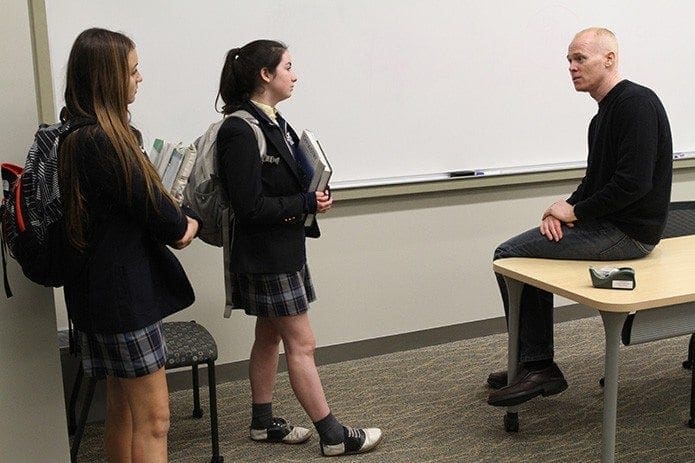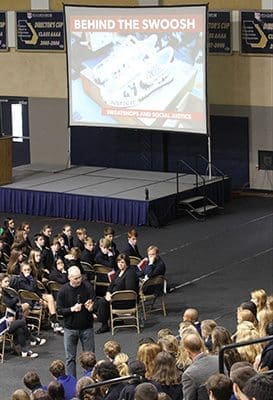 Photo By Michael Alexander
Photo By Michael AlexanderAtlanta
Marist students urged to raise their voices against sweatshops
By ANDREW NELSON, Staff Writer | Published January 8, 2015
ATLANTA—Anti-sweatshop activist Jim Keady encouraged a gym full of students at Marist School to fight for rights of workers who make athletic apparel by using email and social media, and he encouraged the school’s sports teams to cover the logos on their uniforms.
“As a Catholic community, we have a different measuring stick for success,” he said, not letting corporations prosper at the expense of unprotected low-paid workers in the developing world.
“This is where the Gospel gets real, gets messy,” said Keady.
Since the 1990s, Keady, a small business owner in New Jersey, has specifically challenged Nike, Inc., to change its labor practices. His motivation comes from Catholic social teaching, which promotes a just wage and safe working conditions for workers, he said.
Keady spoke at the school in early December. In his presentation he displayed quotes from Nike leaders and contrasted them with photos and anecdotes he heard from people working in Nike’s contract factories in Indonesia. He lived there for a month in 2000, relying on factory wages. After paying for food and housing, there was little money left for other necessities, he said.
Overall, Keady told the gym of young people, more than 90 percent of their clothing is made in sweatshop conditions.
A 2013 Associated Press report found “well under 1 percent of clothing” sold in the U.S. is ethically made.
And nonprofits and organizations that support workers are trying to make it easier for socially responsible consumers to buy these clothes. Fair Trade U.S.A. since 2010 has put its label on apparel made by workers paid a fair wage and in safe conditions. Its online list includes 12 producers.
Also, the International Labor Rights Forum compiles a list of ethically made clothing by factories that respect workers’ rights. It created a “Shop With a Conscience Guide” which does not include any major clothing labels or companies.
Keady highlights the Alta Gracia Co., a fair trade business with corporate headquarters in Spartanburg, South Carolina, and its only factory in Altagracia in the Dominican Republic, as a company with a system for ensuring labor and workers’ rights are respected.
Much of his remarks targeted Nike, but only because the Oregon company is the global industry leader. He puts Nike in the spotlight, he said, because if Nike leaders change their course, other companies will adopt new standards for workers rights.
“When Nike goes, all these other companies will follow,” he said.
Companies adopt codes of conduct
According to Nike’s “Sustainability Report,” posted on its website, “Our focus now is on getting to the root of the problems, evaluating our supplier and manufacturing relationships, and finding new ways to define and share responsibility. We believe that placing the worker at the heart of the workplace and having a factory management that respects and invests in its workforce will result in lasting positive results for workers, the factory and Nike, Inc.”
Nike publishes a list of approximately 600 contract factories that manufacture its products, out of over 700 factories with nearly 1 million employees in 44 countries. It was the first to make its factory list public in 2005.
Its code of conduct prohibits the factories from hiring workers under the age of 16. Nike reports that the average age of workers is 32. The code says workers must be paid at least the minimum wage of the country where the factory is located and allowed 24 hours off consecutively in a seven-day period. Workers are supposed to work no more than 60 hours per week.

Educator and social activist Jim Keady, standing, bottom left, presents his talk, “Behind the Swoosh: Sweatshops and Social Justice,” to the high school student body at Marist School, Atlanta, in December 2014. Keady is also the founding director of Educating for Justice, Inc. Photo By Michael Alexander
Marist’s athletic uniforms are made by the Under Armour company. In fact, a sound of disappointment filled the gym when Keady told them Under Armour uses factories where there are poor working conditions, long hours and low wages.
“They do the same things. Sorry to break the news,” he said.
“As You Sow,” a corporate responsibility group, in 2010 published a report entitled “Toward a Safe, Just Workplace: Apparel Supply Chain Compliance Programs.” It looked at the apparel industry, including fair working conditions among other criteria. The report gave Under Armour a “C-minus.” However, it credited the 15 companies who voluntarily participated, including Under Armour, with being transparent about their programs.
Under Armour’s website includes the company’s code of corporate responsibility.
The Maryland firm “seeks to work with third party suppliers that treat their employees with respect and provide appropriate working conditions for their employees.”
About its suppliers, the company said conditions “may not be perfect. Nonetheless, Under Armour’s suppliers and their supplier’s subcontractors are expected to meet their legal obligations to their employees, and are evaluated to assess whether they respect Under Armour’s Code of Conduct.” The company states its subcontractors cannot employ workers younger than 15 and has the same conditions as Nike regarding weekly hours worked, time off and meeting at least the country’s minimum wage.
Under Armour has its logo at one of the most famous of Catholic universities, Notre Dame.
‘Provocative ideas’ spur ‘lively discussion’
For its part, leaders at Marist said following the presentation that they will examine Keady’s call to action.
“We intend to continue to explore means of living the Gospel values as a school and to promote that lifestyle in our students,” said the school president, Marist Father John Harhager.
The talk “presented some provocative ideas which has evoked equally lively discussion across campus,” he said.
“We view Mr. Keady’s presentation as a challenge to be conscious consumers and to seek ways to promote justice in our world,” said Father Harhager. “This means sometimes making difficult decisions even when they may not be easy or popular.”
Keady said students could support workers by boycotting Nike products, emailing company leaders and contacting sports celebrities who endorse Nike. In addition, he said student athletes should cover an apparel company’s logo on their uniforms.
“Students should not be walking advertisements for transnational corporations,” he said.
The dialogue needs to happen at Marist because covering up the logo can be a “simple, but powerful action,” he said. He said just one Catholic school has taken that step.
The 43-year-old Keady takes care of his family’s restaurant. He served as a councilman in Asbury Park, New Jersey. In the 1990s, he played professional soccer. He later became St. John’s University graduate assistant soccer coach, but Keady refused to wear Nike gear. He said he was forced to resign. The university has challenged that account. At the time, he was earning a degree in theology.
He resigned and has been campaigning against Nike ever since.
Keady started the nonprofit Team Sweat and Educating for Justice. The mission is to examine Nike’s business practices in Asia. He works with local union organizers to fight for overtime pay and better factory conditions. He wants to spur the company to pay a living wage and allow workers to form trade unions to negotiate for better conditions.
Keady has seen some progress, such as women no longer facing a physical exam in order to take leave for their menstrual period. “Each case is a small step toward progress,” he said.